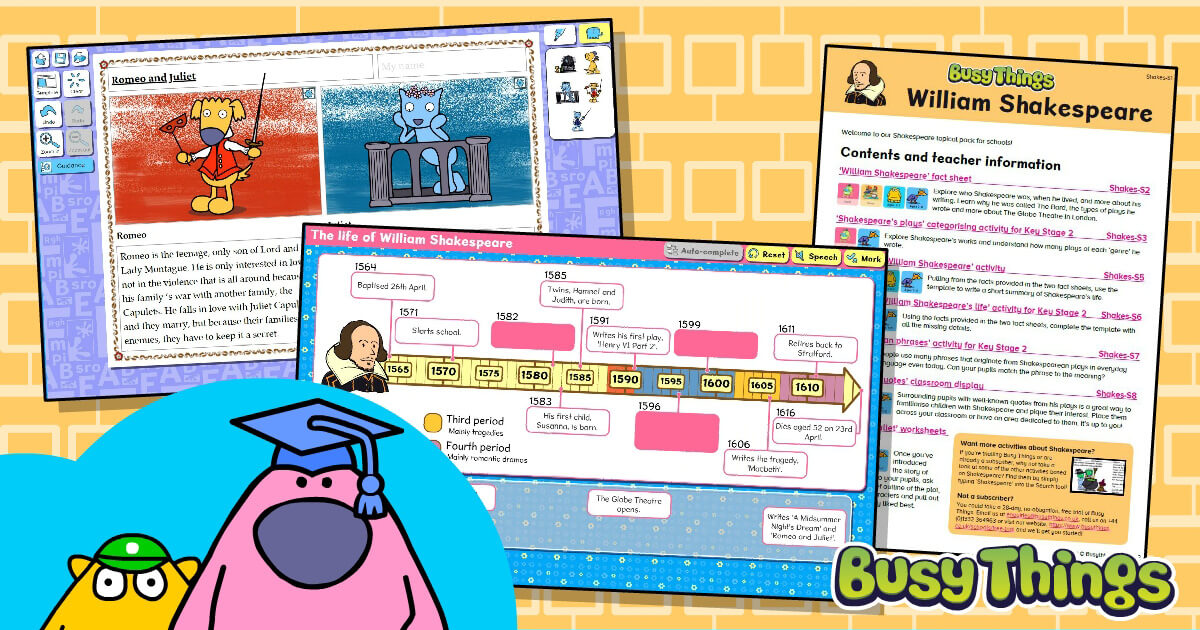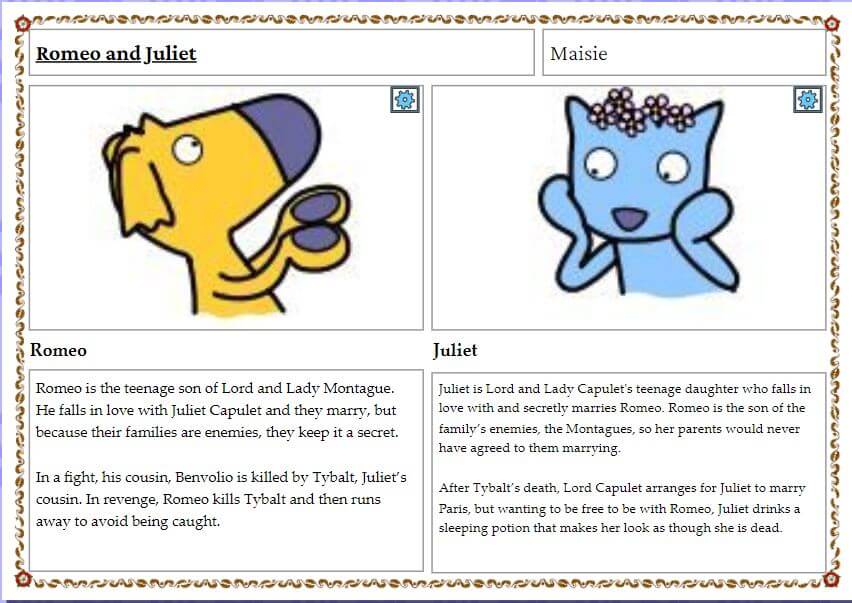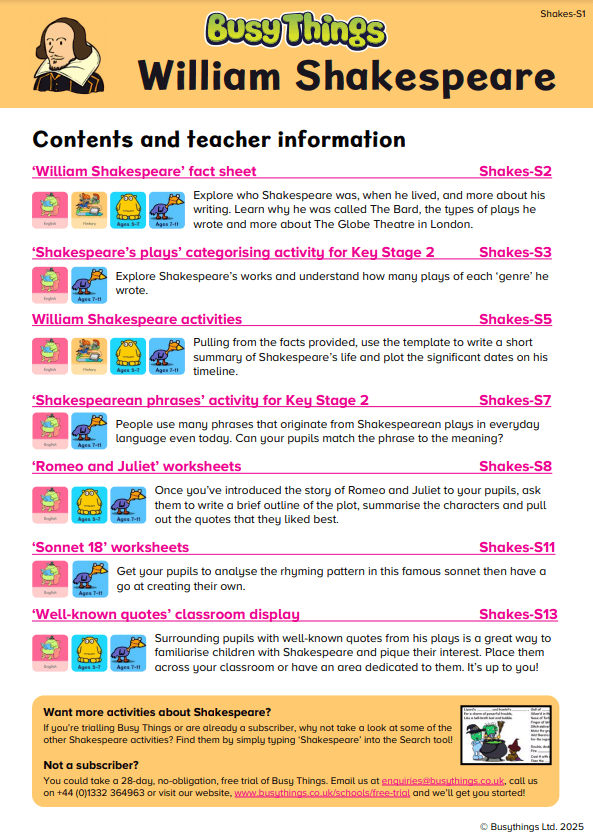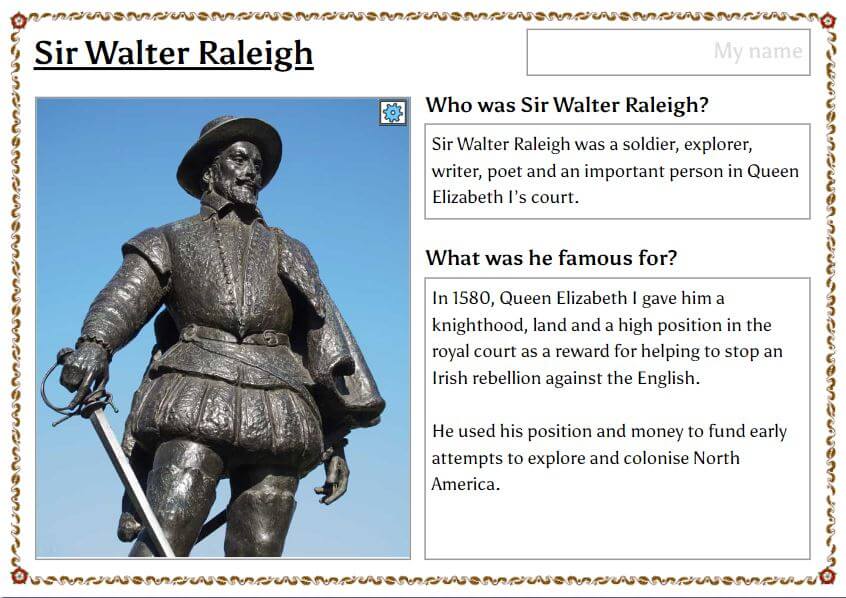5 Fun Activities for Shakespeare Week

Shakespeare Week takes place every year towards the end of March. Organised by the Shakespeare Birthplace Trust, its aim is to celebrate the Bard’s work and make primary school-aged children’s first experience of it a positive one. This can involve Shakespeare’s plays but doesn’t need to be limited to them. There’s a lot of value in looking at Shakespeare as a person, the language used and the Tudors in general.
In this blog, we look at some of Busy Things’ Literacy and History activities you can use to support your week of celebrations and have cherrypicked a few for you to play for free. The activities fall into the following categories:
1. Shakespeare’s life
William Shakespeare was born in April 1564 and died, aged 52, on 23rd April 1616.
He wrote his first play in 1590 and went on to write at least a further 38 plays in his 20-year career.

Find out more about how his writing developed over time with our ‘Timeline of William Shakespeare’s life’ labelling activity.
Not sure you’ve got enough facts to complete the activity? The summary of his life in our topical pack is a good reference document.
Access our ‘Timeline of William Shakespeare’s life’ activity here!
2. Shakespeare’s plays
Shakespeare wrote histories, comedies, tragedies and romantic dramas, as well as poems and sonnets.

Which, if any, have your pupils heard of?
Macbeth, Romeo and Juliet, and Midsummer Night’s Dream are some of the most popular for primary schools to start with because their themes are easy to understand.
Busy Things has writing projects and worksheets on all three plays to support your lesson planning.
Not sure where to start? Our blog “Shakespeare Week: How to Introduce Children to Shakespeare” may give you some inspiration.
3. Shakespeare’s language

The language Shakespeare uses in his plays is often a barrier that prevents the children from following the storyline, which is why it’s often best to see them performed rather than to read them.
Having said that, many of the phrases first seen in Shakespeare’s works have now become ingrained in everyday English and are not considered high-brow at all. We explore some of his best known turns of phrase, such as ‘fair play’ and ‘in a pickle’ in our Shakespeare topical pack.
Note: If the children get struggle with the language, there are Shakespeare -> English translation websites online. There are also English ->Shakespearean ones too, like LingoJam, which allow you to have great fun with the language of Shakespeare’s time.
4. Shakespeare’s theatre
As well as writing plays, Shakespeare is famous for his London theatre, The Globe, which is on the River Thames in London.
His theatre company commissioned its construction and his plays were performed there from 1599 onwards until a fire burnt it to the ground in 1613.

Pupils can explore the detail of the theatre (which is identical to the theatre that stands in its place today) in our ‘The Globe Theatre’ labelling activity.
5. Shakespeare and the Tudors

Shakespeare lived in the time of Elizabeth I’s reign, which was in Tudor time.
It was a period of great exploration.
Find out more about other famous people from that era, such as Christopher Columbus and Sir Walter Raleigh, with our Famous People of Tudor Times writing project.
Summary
So, there you have it! We hope you like some of our suggestions and are able to sprinkle them through the week. Shakespeare can be tremendous fun, and we hope we’ve inspired you to read his plays and learn more about him with your class.
As part of the blog, we’ve included several of our activities which you can play for free. These are: Timeline of William Shakespeare’s life, The Globe Theatre and our William Shakespeare topical pack. To access them, just click on the links.
Want to see more of our Shakespeare activities (and others)?
If you’d like to see more of our activities, you can find them by searching ‘Shakespeare’ using the search tool on the Busy Things home page. Alternatively, go to March > Shakespeare week within the Special events area where you will be able to pin or favourite all the activities in one go.
If you’ve not already got a login, you can easily get one by signing up to one of our free 28-day trials.
This blog was revised and updated in March 2025